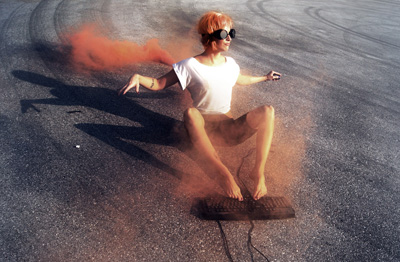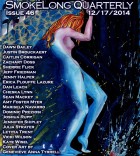Planes are so freaking terrifying. In “Reset,” you tapped into something we all wonder at some point while reclining on these uncomfortable chairs: Is the plane gonna go down? Tell me about your writing process for this particular piece: What came first: the plane or the character’s inner struggle?
I started with the idea of being lost in the sky on a plane. I get lost a lot driving my car. Once I was really lost, at night, in the southwest, low on gas, before GPS navigation, and I believed I would have to spend the night in the desert. The desert is like an entirely different planet to me. I wondered what that might be like on a plane instead. I had to make that even possible first—remove air traffic control, other planes, all forms of navigational tools, prolong the time in the air—and once I did that, things got pretty terrifying. I thought it would be interesting to write from the perspective of the pilot, a character expected to stay in control. The inner struggle bubbled up out of that.
There are many things in this story that are only known in the negative, in passages such as, “What I notice first is all the things I no longer feel like doing” or “There are many questions people will ask that I no longer want to answer, but this isn’t one of them.” What are a few things you never tell people about yourself?
I was old when I discovered Santa Claus wasn’t real. I had potential to go on believing for much longer, because no one told me; I found all the gift receipts in a closet. And I’ve had a few moments of outrageous rage. Maybe the two are connected.
You described in “Reset” the different ways people react to a life-threatening situation: the crying, the laughing, the clapping, the screaming, the quiet. Chaos. Is it something that you usually explore in your writing? And what other themes are important to you?
I don’t usually put my characters in life-threatening situations, but it seems like a good exercise to imagine how characters might physically move on the page and to conceptualize interior responses to pressure. Lately I’ve been sketching already dead characters. Loss is a theme I’m exploring. I find myself wanting to write about how people are affected by loss, the ways it shapes the trajectory of their lives. Communication is another theme important to me—characters’ ability or inability to communicate, tendencies that allow or prevent it, the validity of what is communicated.
The story does this weird thing with time. All the tension slows down time and the result is a bit nerve-racking. After reading “Reset,” I started thinking about other plane crash stories. The series Lost (and its questionable ending), of course, but also two very silly movies: Soul Plane and Snakes on a Plane (famous for Samuel L. Jackson screaming, “I have had it with these motherf#$%*@^ snakes on this motherf#$%*@^ plane.”) I always wonder who watches these absurd movies (other than me). Have you seen them? What movies would you never admit having enjoyed?
Never heard of Soul Plane, but I Googled it and saw that Method Man, Snoop Dog, and Sofia Vergara are in it, so I might check it out. I’ve seen small chunks of Snakes on a Plane but mostly remember the personalized voicemail you could send to your friends in Samuel L. Jackson’s voice. I saw Speed twice in the movie theater. I was pretty into Drop Dead Fred at one point. I won’t watch it again because I don’t want my memory of it tainted. Is Death Becomes Her considered a bad movie? Where Meryl Streep walks around with her head twisted backwards and Goldie Hawn has a giant hole in her stomach? I love that movie.
Your thoughts on marriage?
This is one of those tricky questions that can be easy or hard to answer. I have assorted thoughts and some sly humor to respond with. How about some poetry instead? Here is a stanza from one of Pablo Neruda’s sonnets (translated by Stephen Tapscott):
I love you as the plant that never blooms
but carries in itself the light of hidden flowers;
thanks to your love a certain solid fragrance,
risen from the earth, lives darkly in my body.



 The SmokeLong Grand Micro Contest (The Mikey) is now an annual competition celebrating and compensating the best micro fiction and nonfiction online.
The SmokeLong Grand Micro Contest (The Mikey) is now an annual competition celebrating and compensating the best micro fiction and nonfiction online.